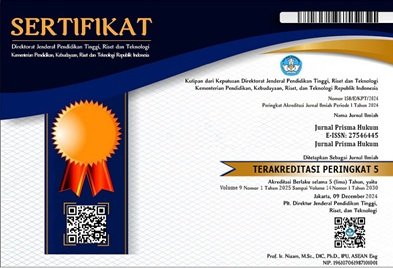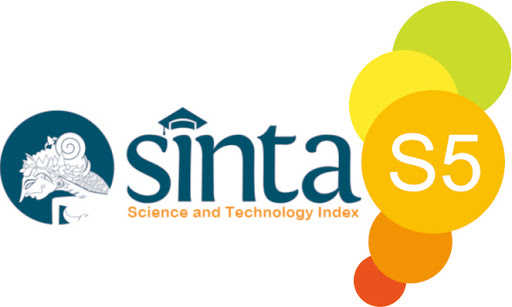IMPLEMENTASI PENYELESAIAN TINDAK PIDANA PENGGUNA NARKOTIKA MELALUI KEADILAN RESTORATIF PADA KEJAKSAAN NEGERI JAKARTA BARAT
(Studi Surat Ketetapan Penyelesaian Perkara Berdasarkan Keadilan Restoratif Kepala Kejaksaan Negeri Jakarta Barat Nomor: 1127/M.1.12.1/Enz.2/10/2023)
Kata Kunci:
Keadilan Restoratif, Tindak Pidana Narkotika, Pengguna Narkotika, Penghentian Penuntutan, Dominus LitisAbstrak
Penelitian ini dilatarbelakangi oleh pergeseran paradigma dalam penanganan tindak pidana pengguna narkotika di Indonesia, dari pendekatan retributif menuju rehabilitatif yang diamanatkan oleh Undang-Undang No. 35 Tahun 2009. Implementasi kebijakan ini melalui keadilan restoratif (RJ) oleh Jaksa sebagai dominus litis menghadapi tantangan berupa disharmoni regulasi antar lembaga penegak hukum. Rumusan masalah dalam penelitian ini adalah: 1) Bagaimana pengaturan hukum penyelesaian tindak pidana pengguna narkotika melalui keadilan restoratif oleh Jaksa Penuntut Umum? 2) Bagaimana implementasi penyelesaian tindak pidana tersebut pada Kejaksaan Negeri Jakarta Barat? Tujuan penelitian ini adalah untuk menganalisis pengaturan hukum yang ada serta mengkaji implementasi konkret dari penyelesaian perkara pengguna narkotika melalui keadilan restoratif. Penelitian ini menggunakan metode penelitian yuridis normatif dengan pendekatan perundang-undangan, konseptual, dan studi kasus. Analisis dilakukan menggunakan Teori Keadilan Restoratif, Teori Kewenangan (dominus litis), Teori Pertanggungjawaban Pidana, dan Teori Kepastian Hukum. Hasil penelitian menunjukkan bahwa, pertama, pengaturan hukum bagi Jaksa telah terstruktur dengan baik melalui Pedoman Jaksa Agung No. 18 Tahun 2021, namun masih terdapat disharmoni dengan peraturan di lembaga lain. Kedua, implementasi pada studi kasus di Kejaksaan Negeri Jakarta Barat berhasil dilaksanakan sesuai prosedur, di mana Jaksa, setelah memverifikasi terpenuhinya syarat objektif seperti batas barang bukti dan rekomendasi TAT, menghentikan penuntutan dan mengalihkan tersangka ke program rehabilitasi. Keberhasilan ini menegaskan aktualisasi peran Jaksa sebagai dominus litis dalam mewujudkan tujuan pemulihan.
This research is motivated by a paradigm shift in the handling of criminal acts of narcotics users in Indonesia, from a retributive to a rehabilitative approach mandated by Law No. 35 of 2009. The implementation of this policy through restorative justice (RJ) by the Prosecutor as a dominus litis faces challenges in the form of regulatory disharmony between law enforcement agencies. The formulation of the problem in this study is: 1) How is the legal arrangement for the settlement of criminal acts of narcotics users through restorative justice by the Public Prosecutor? 2) How is the implementation of the settlement of the crime at the West Jakarta District Attorney's Office? The purpose of this research is to analyze the existing legal arrangements and examine the concrete implementation of the settlement of narcotics user cases through restorative justice. This research uses normative juridical research methods with legislative, conceptual, and case study approaches. The analysis was carried out using the Theory of Restorative Justice, the Theory of Authority (dominus litis), the Theory of Criminal Responsibility, and the Theory of Legal Certainty. The results of the study show that, first, the legal arrangements for the Prosecutor have been well structured through the Attorney General's Guideline No. 18 of 2021, but there is still disharmony with regulations in other institutions. Second, the implementation of the case study at the West Jakarta District Attorney's Office was successfully carried out according to the procedure, where the Prosecutor, after verifying the fulfillment of objective conditions such as the limit of evidence and the TAT recommendation, terminated the prosecution and transferred the suspect to a rehabilitation program. This success confirms the actualization of the role of the Prosecutor as a dominus litis in realizing the goal of recovery.





